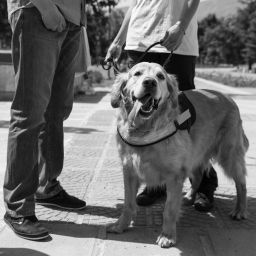Service dogs, specifically trained to perform tasks that assist people living with physical challenges, help improve their human companion’s independence and well-being in numerous ways. Service dogs make especially valuable pets for people with Parkinson’s. They prompt people to exercise more, feel less lonely, and experience fewer instances of freezing and falling. Parkinson’s service dogs can also retrieve and carry objects, enhance a person’s balance, open doors, turn on lights, call 9-1-1, and much more.
In this interview, Lisa Skandali, an MSc graduate of Clinical Neuropsychology at the University of Groningen in the Netherlands, shares her research on the subject of service dogs for people with Parkinson’s and Lewy Body Dementia and how service dogs can support people with Parkinson’s.
You can watch the interview below.
SHOW NOTES
- Because service dogs require exercise, their owners are more active. For people with Parkinson’s, that means they reap the countless benefits that accompany physical activity.
- Research suggests that service dogs can interrupt resting tremor in people with Parkinson’s, as well as minimizing freezing of gait (FOG).
- Though pharmacological interventions for Parkinson’s have been widely researched, lifestyle interventions, such as having a Parkinson’s service dog, have not been as widely studied.
- Having a dog accompany you to therapy sessions can help you feel relaxed, open, safe, and more willing to discuss topics that may otherwise make you feel uncomfortable.
- Lisa is eager to conduct a study comparing symptoms of people with Parkinson’s who do not have dogs, those who have dogs as pets, and those who have trained service dogs. (Want to take part in her initial survey? Click here to complete it.)
- People with Parkinson’s who have dogs as pets enjoy numerous benefits, including more socialization, exercise, time outdoors, and more. Because pets do require much attention, however, people with Parkinson’s who have never had dogs or who have more severe motor symptoms might benefit more from having specifically trained service dogs.
- Studies have shown that surgery patients who had meaningful interactions with therapy dogs during their hospital stay experienced less pain and were discharged from the hospital sooner than patients who had no interactions with the dogs.
- If you’re thinking about getting a Parkinson’s service dog, here are a few things to consider that were not discussed in the video: the right service dog can actually reduce care partner burden; some dogs require much more activity than others; so, keep your current and anticipated activity in mind when considering different breeds; timing is everything and while service dogs can be fabulous partners, they aren’t ideal when your Parkinson’s has progressed to the point where you are less mobile.
- Finally, Parkinson’s service dogs are not easy to find. Nor are they inexpensive. If you’re interested in learning more, the BEST place to start is your local community. Connect with service dog trainers in your area and ask around. And, reach out to some of the national organizations such as Assistance Dogs International, IAADP, Paws with a Cause, and Service Dog Project to find out more.
HOW CAN YOU GET INVOLVED?
If you have a service dog or are interested in having one, please take this survey to help advance research in this area.
WANT TO LEARN MORE ABOUT HOW SERVICE ANIMALS CAN HELP YOU LIVE WELL?
Life with Dempsey, my Parkinson’s Service Dog
Training Dempsey, my Parkinson’s Service Dog
Therapy Dogs May Unlock Health Benefits for Patients in Hospital ICUs
Effect of Animal-Assisted Therapy on Patients in the Department of Long-term Care: A Pilot Study




